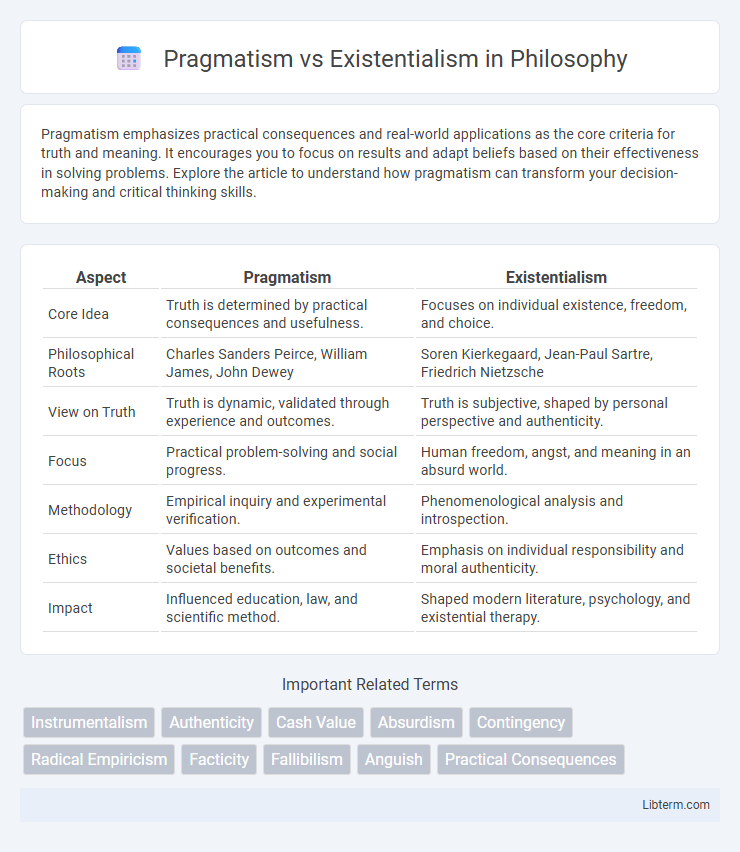Pragmatism emphasizes practical consequences and real-world applications as the core criteria for truth and meaning. It encourages you to focus on results and adapt beliefs based on their effectiveness in solving problems. Explore the article to understand how pragmatism can transform your decision-making and critical thinking skills.
Table of Comparison
| Aspect | Pragmatism | Existentialism |
|---|---|---|
| Core Idea | Truth is determined by practical consequences and usefulness. | Focuses on individual existence, freedom, and choice. |
| Philosophical Roots | Charles Sanders Peirce, William James, John Dewey | Soren Kierkegaard, Jean-Paul Sartre, Friedrich Nietzsche |
| View on Truth | Truth is dynamic, validated through experience and outcomes. | Truth is subjective, shaped by personal perspective and authenticity. |
| Focus | Practical problem-solving and social progress. | Human freedom, angst, and meaning in an absurd world. |
| Methodology | Empirical inquiry and experimental verification. | Phenomenological analysis and introspection. |
| Ethics | Values based on outcomes and societal benefits. | Emphasis on individual responsibility and moral authenticity. |
| Impact | Influenced education, law, and scientific method. | Shaped modern literature, psychology, and existential therapy. |
Introduction to Pragmatism and Existentialism
Pragmatism is a philosophical tradition emphasizing practical consequences and real-world applications as the primary criteria for meaning and truth, originating in the late 19th century with thinkers like Charles Sanders Peirce and William James. Existentialism, emerging in the 20th century through figures such as Soren Kierkegaard, Jean-Paul Sartre, and Martin Heidegger, centers on individual freedom, authentic existence, and the inherent meaninglessness of life that must be confronted personally. Both philosophies explore human experience but diverge in their approach: pragmatism values practical outcomes, while existentialism focuses on subjective meaning and individual choice.
Historical Backgrounds of Pragmatism and Existentialism
Pragmatism originated in the late 19th century United States, notably developed by philosophers Charles Sanders Peirce, William James, and John Dewey, emphasizing practical consequences and experiential learning as the basis of truth. Existentialism emerged mainly in 20th century Europe, with roots in the works of Soren Kierkegaard and Friedrich Nietzsche and was later expanded by Jean-Paul Sartre and Martin Heidegger, focusing on individual freedom, choice, and subjective experience. The historical contexts reflect distinct philosophical priorities: Pragmatism arose during American industrialization prioritizing action and results, while Existentialism evolved amid the political upheaval of early 20th century Europe, emphasizing personal meaning in an absurd world.
Core Principles of Pragmatism
Pragmatism centers on practical consequences and real-world applications as the primary criteria for determining the truth of beliefs, emphasizing action and experience over abstract principles. Core principles include the idea that truth is not absolute but evolves through interactions and outcomes, and knowledge must be tested through problem-solving and effective results. This philosophy contrasts with existentialism's focus on individual existence, freedom, and subjective meaning.
Fundamental Tenets of Existentialism
Existentialism centers on individual freedom, authentic existence, and the inherent meaninglessness of life, emphasizing personal responsibility and the struggle to create one's own purpose. Unlike pragmatism, which values practical outcomes and problem-solving, existentialism confronts the subjective experience of anxiety, absurdity, and death. Key figures such as Kierkegaard, Sartre, and Camus explore themes of alienation, choice, and the search for meaning in an indifferent universe.
Key Philosophers Associated with Both Movements
Pragmatism is closely associated with philosophers like Charles Sanders Peirce, William James, and John Dewey, who emphasized the practical consequences and applications of ideas as central to meaning and truth. Existentialism, on the other hand, is linked to key figures such as Soren Kierkegaard, Jean-Paul Sartre, and Martin Heidegger, who explored themes of individual freedom, choice, and the search for authentic existence. Both movements offer contrasting approaches: pragmatism prioritizes the utility and action-guiding nature of beliefs, while existentialism centers on individual subjectivity and personal meaning in an often absurd world.
Pragmatic Approach to Truth and Reality
The pragmatic approach to truth emphasizes the practical consequences and utility of beliefs in guiding action, viewing truth as what works effectively in real-world situations. Unlike existentialism's focus on individual experience and subjective meaning, pragmatism asserts that reality is understood through coherent, testable ideas that produce reliable outcomes. This philosophy prioritizes adaptable, results-oriented methods for navigating and interpreting reality over abstract, introspective exploration.
Existentialist Perspective on Meaning and Freedom
Existentialism emphasizes individual freedom, asserting that meaning is not inherent but must be created through authentic choices in an indifferent universe. Key figures like Jean-Paul Sartre and Albert Camus argue that humans are condemned to be free, responsible for imbuing their existence with purpose despite absurdity. This philosophy contrasts pragmatism's focus on practical consequences by prioritizing subjective experience and personal commitment to self-defined values.
Practical Applications in Modern Society
Pragmatism emphasizes practical consequences and real-world results, shaping fields like education, law, and governance by promoting adaptive problem-solving and efficient decision-making. Existentialism centers on individual freedom, authenticity, and personal responsibility, influencing mental health therapies and ethical frameworks that prioritize self-awareness and meaning-making. Both philosophies contribute to modern society by balancing objective utility with subjective experience in addressing complex human challenges.
Contrasts and Overlaps Between Pragmatism and Existentialism
Pragmatism emphasizes practical consequences and utility as the basis for truth, while existentialism centers on individual experience, freedom, and authenticity. Both philosophies address human agency but differ in their approach: pragmatism seeks objective validation through action, whereas existentialism explores subjective meaning amidst absurdity. Overlaps arise as both reject absolute certainties, promoting a dynamic, lived engagement with reality.
Conclusion: Relevance in Contemporary Philosophy
Pragmatism emphasizes practical consequences and actionable truth, making it highly relevant in addressing real-world problems through adaptive reasoning. Existentialism centers on individual freedom, authenticity, and subjective meaning, providing deep insights into personal identity and human experience in modern society. Both philosophies remain essential for contemporary discourse, blending pragmatic problem-solving with existential reflection to navigate complex ethical and social challenges.
Pragmatism Infographic

 libterm.com
libterm.com